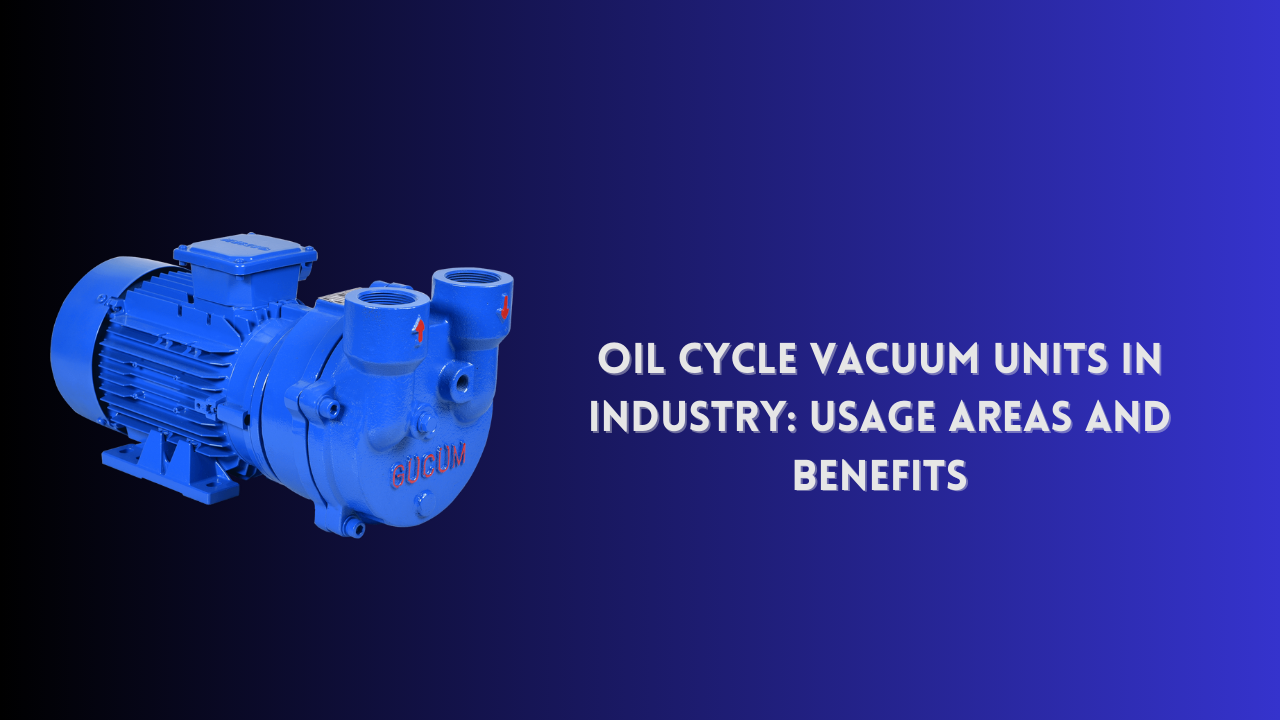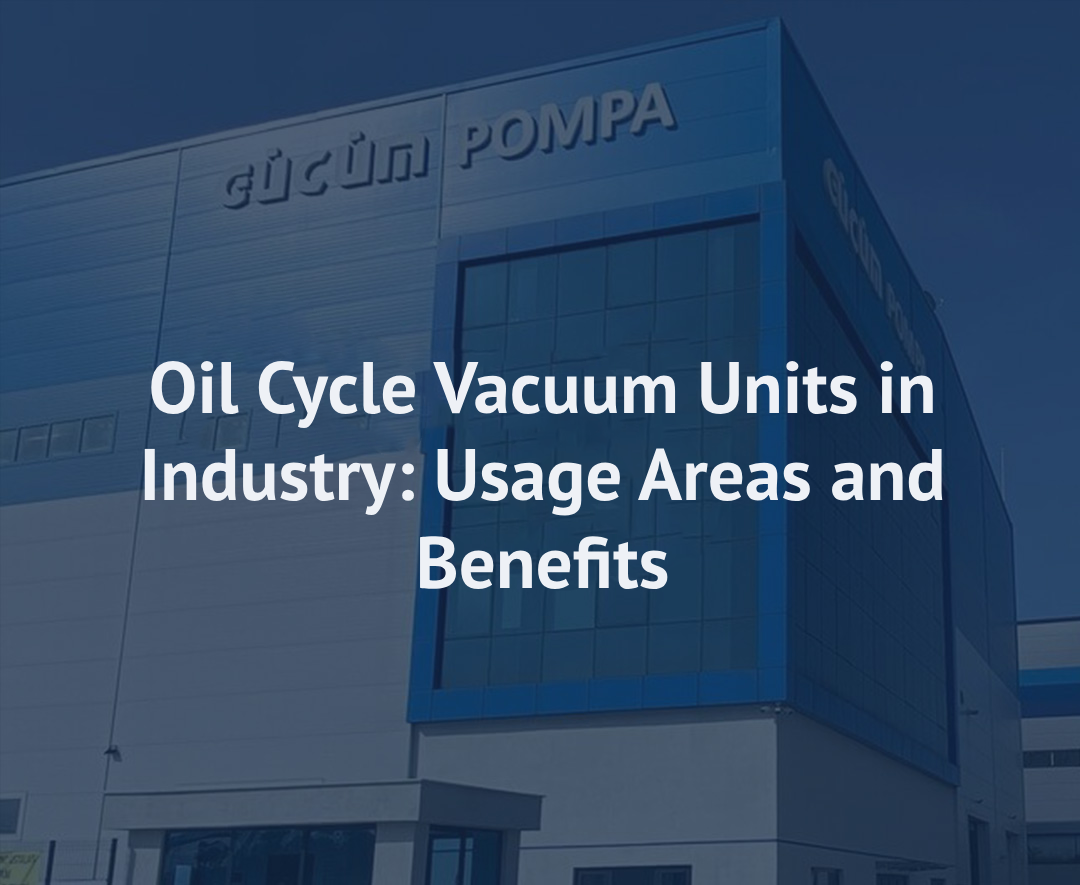Oil Cycle Vacuum Units in Industry: Usage Areas and Benefits
Table of Contents
-
Definition of Oil-Circulated Vacuum Units
-
Use in the Chemical Industry
-
Use in the Petrochemical Sector
-
Use in the Food and Beverage Industry
-
Use in the Electronics and Semiconductor Industry
-
Other Industrial Areas
-
Benefits of Oil-Circulated Vacuum Units
-
Energy Efficiency of Oil-Circulated Vacuum Units
Definition of Oil-Circulated Vacuum Units
Oil-circulated vacuum units are high-performance devices used in various industrial fields, employing oil-based systems to provide vacuum. These units typically operate with a mechanical pump and oil cooling system to achieve high vacuum levels and maintain them consistently. During vacuum creation, the oil circulates within the system, cooling the motor and thereby ensuring increased efficiency. Oil-circulated vacuum units are frequently preferred in industrial processes due to their longevity and ability to deliver high efficiency.
Use in the Chemical Industry
The chemical industry is one of the most common areas where oil-circulated vacuum units are utilized. Vacuum application may be required to accelerate and purify chemical reactions. These systems are highly effective in processes such as vacuum distillation, solvent evaporation, and chemical purification. Oil-circulated vacuum units provide high vacuum levels, helping chemical processes to be carried out more quickly and effectively. Additionally, vacuum enables the removal of unwanted byproducts in chemical reactions, which enhances product quality.
Use in the Petrochemical Sector
The petrochemical industry is another significant area of use for oil-circulated vacuum units. During crude oil refining, the separation of unwanted gases and vapors is necessary. These units ensure stable high vacuum levels in such processes, making operations safer and more efficient. Moreover, their use provides energy efficiency and reduces operational costs. Oil-circulated vacuum units also play a crucial role in petrochemical plants for solvent recovery and the removal of unwanted gases from the environment.
Use in the Food and Beverage Industry
The food and beverage industry is also a sector where oil-circulated vacuum units are widely used. During food processing, operations such as vacuum drying, water evaporation, and concentration are often required. Vacuum processes are particularly employed to preserve the taste and nutritional value of food products. Oil-circulated vacuum units operate at low temperatures in these processes, maintaining product freshness and minimizing nutrient loss. Furthermore, vacuum drying extends the shelf life of food products. These systems also reduce operational costs for food producers by offering energy efficiency.

Use in the Electronics and Semiconductor Industry
In the electronics and semiconductor industry, oil-circulated vacuum units are used in precision processes such as microchip production, testing, and surface coating. Achieving high vacuum levels is critical in these industries. Oil-circulated vacuum systems are among the most commonly used vacuum devices in this sector. During the production of electronic components, moisture and air must be removed under vacuum, as these elements can negatively affect product quality. Oil-circulated vacuum units perform these tasks with high efficiency, ensuring a safe and effective production process.
Pharmaceutical Production
The pharmaceutical industry requires precise processes to produce products with the highest quality and safety standards. Oil-circulated vacuum units are used in pharmaceutical production, particularly for purifying active ingredients, evaporation, and drying processes. A vacuum environment enables faster and more efficient purification of reactive components. Additionally, vacuum processes ensure the proper dissolution of additives to enhance drug efficacy. This makes the production process faster and more efficient while improving product quality.
Automotive Industry
The automotive industry benefits from vacuum technologies in various production stages, including metal processing, parts cleaning, drying, and assembly. Oil-circulated vacuum units are particularly used for cleaning automotive parts, preparing surfaces before painting, and vacuum cooling processes. Vacuum systems help remove dirt or foreign substances from automotive parts, improving assembly quality. Moreover, oil-circulated systems ensure proper coating application on metal surfaces, enhancing product durability.
Textile and Paper Industry
The textile and paper industry faces processes requiring extensive liquid use during production. In the textile sector, vacuum usage is crucial for dyeing, drying, and washing operations. Oil-circulated vacuum units perform water evaporation quickly and efficiently in these processes. Additionally, these systems can reduce water consumption, providing an environmental advantage. In the paper industry, vacuum systems remove excess moisture during paper production, improving product quality and shortening drying times.
Metal Processing and Manufacturing
The metal processing industry is an area where large amounts of heat and energy are utilized. During metal part processing, vacuum technologies enhance process efficiency. Oil-circulated vacuum units are employed to improve the efficiency of coating applications on metal surfaces. Vacuum-based coating significantly increases material durability. Furthermore, oil-circulated vacuum systems ensure proper separation of gases and vapors generated during metal processing, contributing to occupational health and safety.
Electric Motors and Generators
In the production of industrial machines like electric motors and generators, processes such as parts cleaning and cooling are critical. Oil-circulated vacuum units are effectively used for cooling and cleaning these machine components. Additionally, oil-based systems enable efficient motor operation, reducing energy consumption and extending system lifespan. Vacuum technologies during production, particularly for protecting sensitive parts, help improve product quality.
Recycling and Waste Management
In the recycling industry, vacuum systems are used, particularly during the separation and processing of waste materials. Oil-circulated vacuum units play an active role in separating and recycling organic waste. Vacuum systems enhance the purity of recycled materials, increasing the reuse rate. Moreover, their use aids in proper waste processing, reducing environmental impact. In waste management, the efficiency and speed provided by vacuum technologies lower operational costs for businesses.
Aerospace Industry
The aerospace industry is a highly precise and safety-critical field. In this sector, vacuum technologies are utilized during the production and maintenance of aircraft and spacecraft parts. Oil-circulated vacuum units play a critical role in testing, cleaning, and assembling these parts. Additionally, vacuum environments ensure the safe processing of sensitive components, aiding in material quality improvement. Oil-circulated vacuum units enable processes compliant with the high safety standards of the aerospace industry.
Energy Production and Distribution
In the energy sector, oil-circulated vacuum units are used to ensure the efficient operation of steam turbines and other energy production equipment. These systems remove excess heat during energy production, enhancing energy efficiency. Oil-circulated vacuum units are also employed in maintenance processes for energy production systems, extending equipment lifespan and minimizing failures. Additionally, vacuum systems assist in detecting gas and air leaks in energy transmission lines.
Benefits of Oil-Circulated Vacuum Units
Oil-circulated vacuum units stand out for the advantages they offer in numerous industrial processes. Some of their key benefits include:
High Performance: Oil-circulated vacuum units have the ability to reach high vacuum levels, providing a significant advantage in industrial processes requiring high precision and performance.
Energy Efficiency: Oil-circulated systems enable more efficient operation of mechanical parts and prevent overheating, helping reduce energy consumption.
Longevity and Reliability: With regular maintenance, oil-circulated vacuum units can operate trouble-free for many years, allowing businesses to use a reliable system in the long term.
Low Maintenance Costs: These units are generally durable and long-lasting, reducing maintenance and spare parts costs.
Energy Efficiency of Oil-Circulated Vacuum Units
Oil-circulated vacuum units stand out in industry as systems that provide energy efficiency. The use of oil cools motors, preventing overheating and offering energy savings. Oil-circulated vacuum systems allow continuous operation of processing tasks and achieve greater efficiency with less energy consumption thanks to high vacuum levels. Additionally, the proper design of oil circulation and cooling systems enhances energy efficiency, providing cost savings for businesses.
In industry, oil-circulated vacuum units are an indispensable tool for many processes. In sectors such as chemical, petrochemical, food and beverage, and electronics, these units offer high performance, energy efficiency, and long-term operational benefits. Oil-circulated vacuum systems can be adapted to the specific needs of each industry, helping businesses improve their operational efficiency. Consequently, the importance of oil-circulated vacuum units in industry continues to grow day by day.


